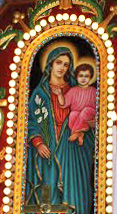|
|
by His Holiness Moran Mor Ignatius Zakka I Iwas

Behold the virgin, the Mother of God, with everlasting virginity. The first born of first borns and the virgin of virgins, who gave birth to the Incarnated Lord. She remained virgin until after the birth of Jesus as stated before. When Mathew, the Evangelist, referred to the Virgin saying " And knew her not till she had brought forth her first born son (Matt. 1:25), he meant to confirm to us that she was a virgin before the birth of Jesus, remained a virgin during childbirth and until after the birth of Lord Jesus and that she conceived her son of the Holy Spirit without the seed of a man.
Mathew did not refer to Mary's virginity after Jesus' birth and the affirmation that Joseph did not know Mary physically and that they did not consummate their union before the birth of Jesus, does not imply the confirmation that he knew her after Jesus' birth. The term (unto) is not always used to denote inapplicability to what follows afterwards. This can be clearly understood, based on the use of the term in other contexts in the Holy Book such as: "Therefore Michal, the daughter of Saul had no child unto the day of her death" (2 Sam (6:23). Who would ever infer that she gave birth to children after her death?
The phrase "did not know her "might have meant Joseph did not know how venerable she was and how great her spiritual status in the eyes of God was until she gave birth to her first born son, and he beheld the miraculous virgin birth and the angels surrounding the manger. To sum up, Joseph did not consummate their union and Mary is ever virgin.
"Her first born", the phrase stated also in the Gospel of (Luke 2: 6-7) does not
mean that the virgin gave birth to other children after Jesus, and consequently,
she was not ever virgin. This expression "the first born" is, however, an
appellation usually given to the first child whether he had brothers after him
or not. This is the concept conveyed in the Holy Book where the commandment
instituted that the first born be the redeemer, and he was not expected to have
had other brothers to be confirmed as the first born. It goes without saying
that had Jesus had brethren he would have handed his mother over to them and
would not have entrusted her to John, the disciple he loved.
Many are the connotations of the phrase "the first born" used as a descriptive
term of Jesus. He is the first born of the heavenly Father, the first born of
Mary, and the first born of the departed…. Etc…
Those, Who were called the Lord's brethren in the Holy Gospel (Matt 13:55) were his relatives, that is his cousins on both mother's and father's side, because this term "brethren" is used in the divine inspiration to denote relatives and members of one tribe (Gen. 31:37, Ex. 2:11). For that reason, Abraham called Lot, who was his nephew, his brother.
Shunoyo Supplement Home | Previous Page | Table of Contents | Next Page
Shunoyo Home | Lectionary Sermons | General Essays | Articles | eBooks | Our Faith | Church Fathers | Prayers | Library - Home
-------
Malankara World
A service of St. Basil's Syriac Orthodox
Church, Ohio
Copyright © 2009-2020 - ICBS Group. All Rights Reserved.
Disclaimer
Website designed, built, and hosted by
International Cyber Business Services, Inc., Hudson, Ohio